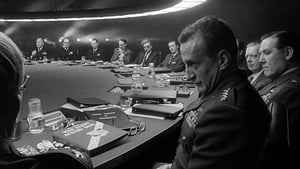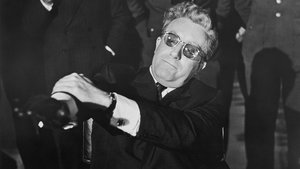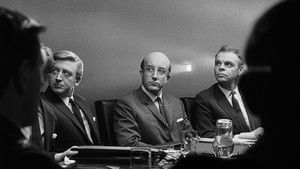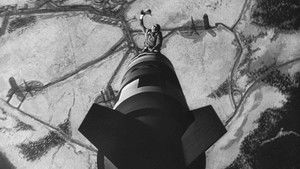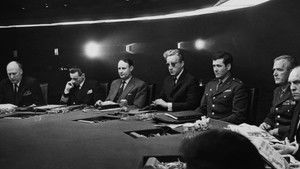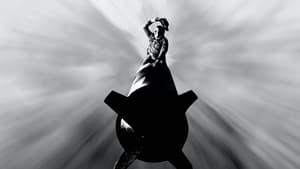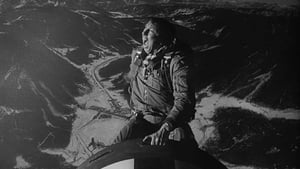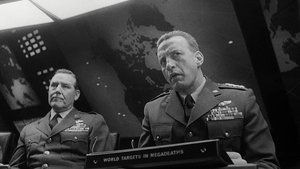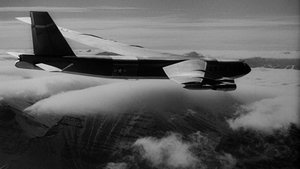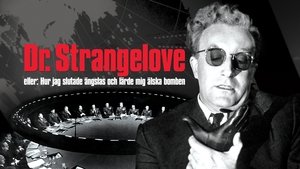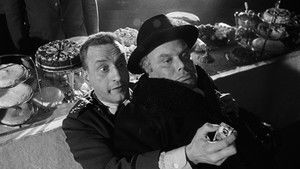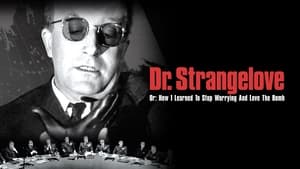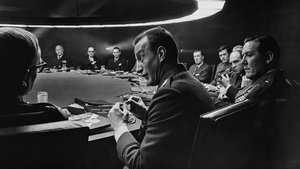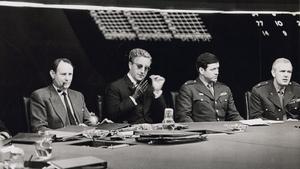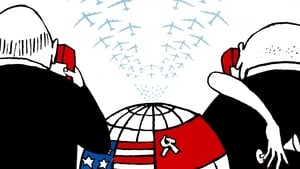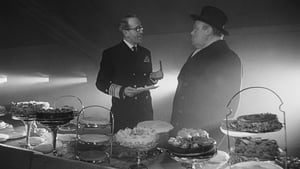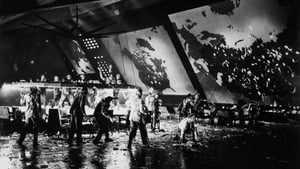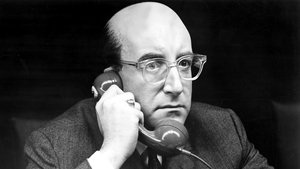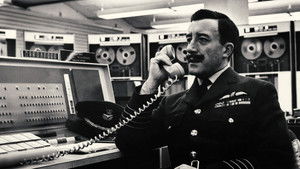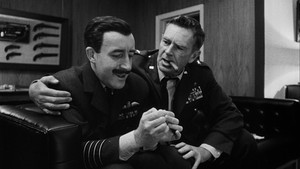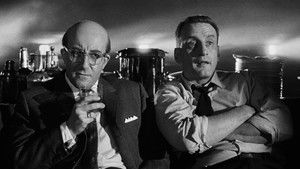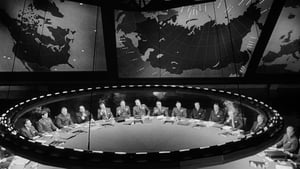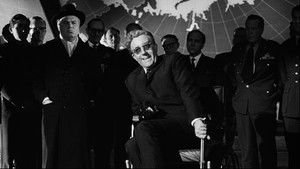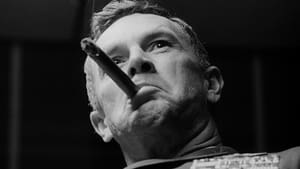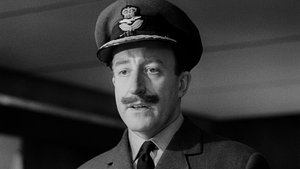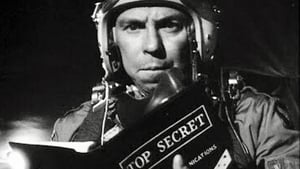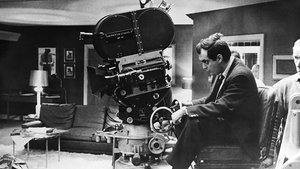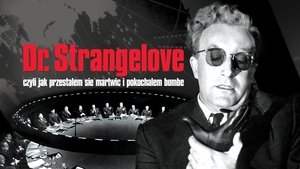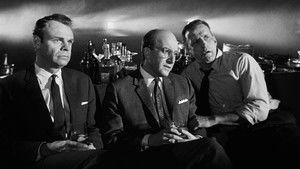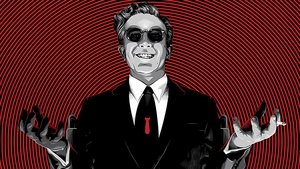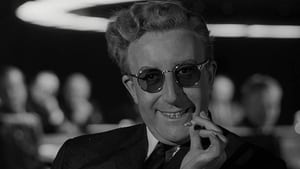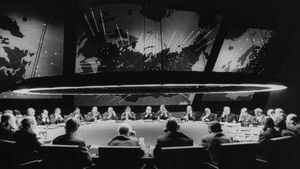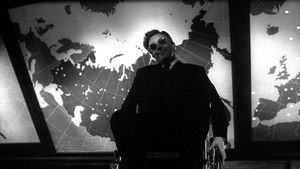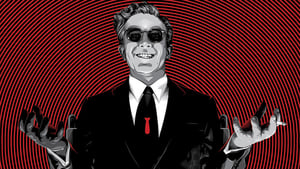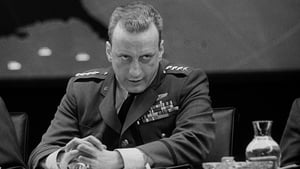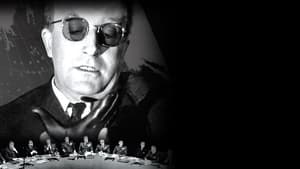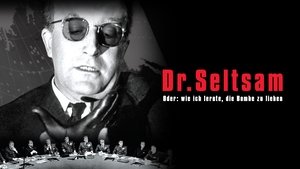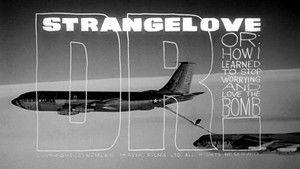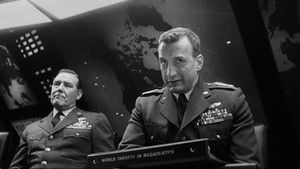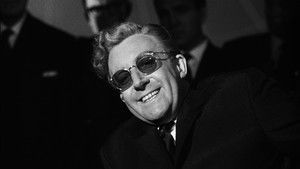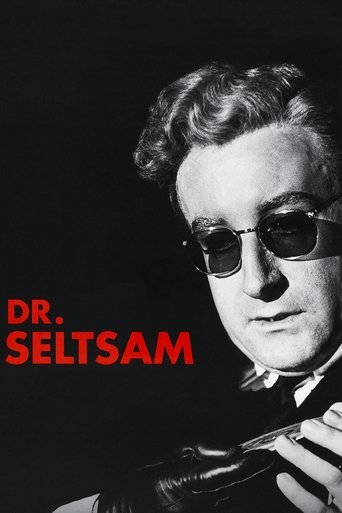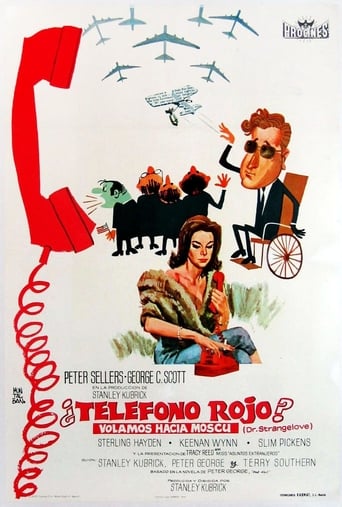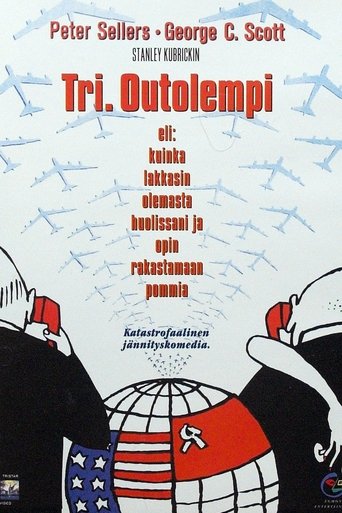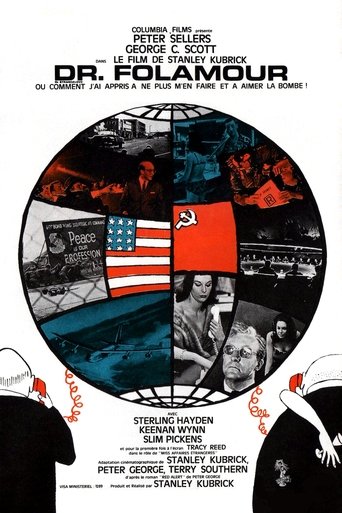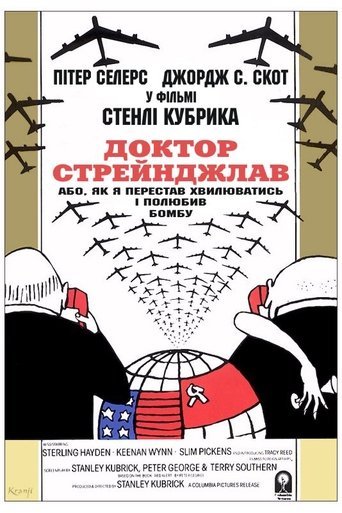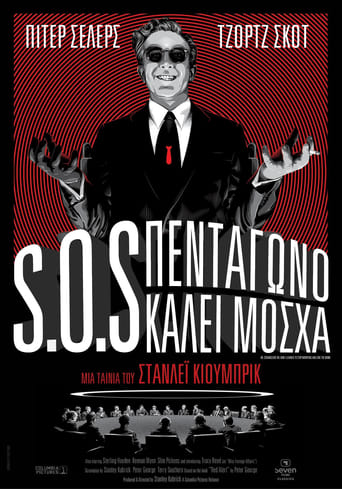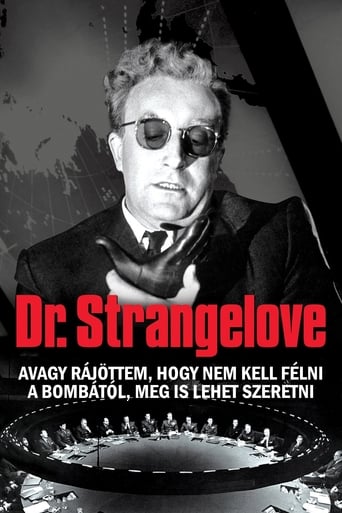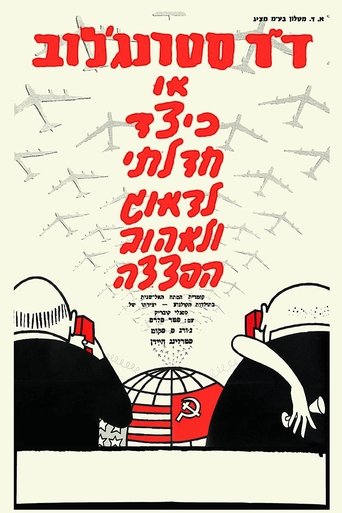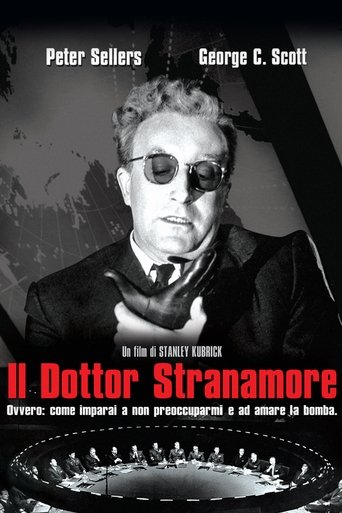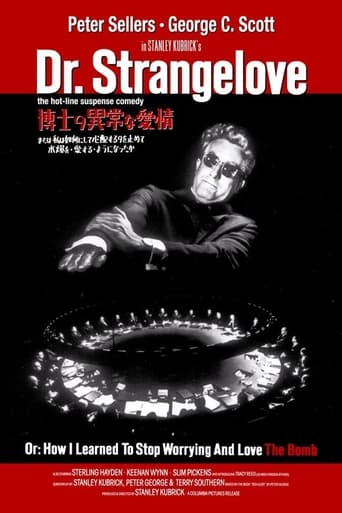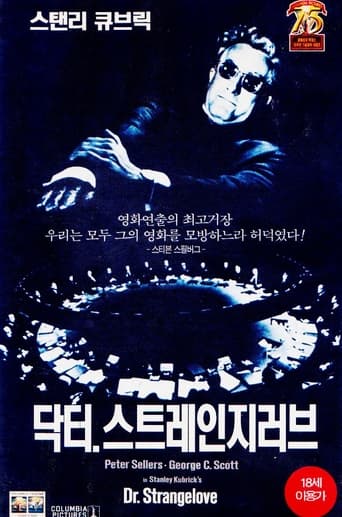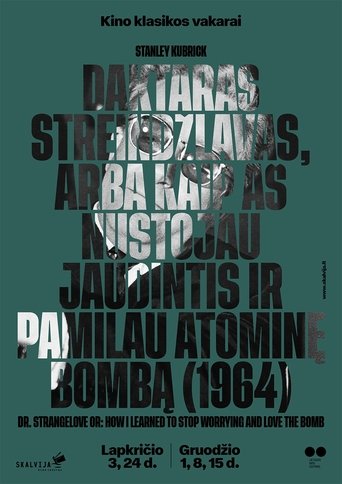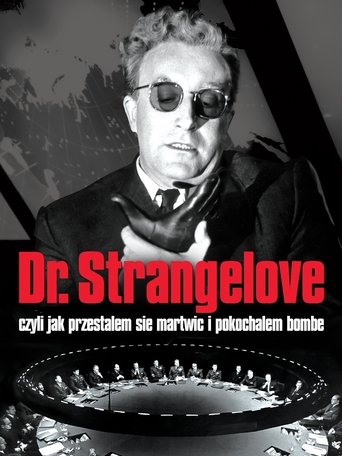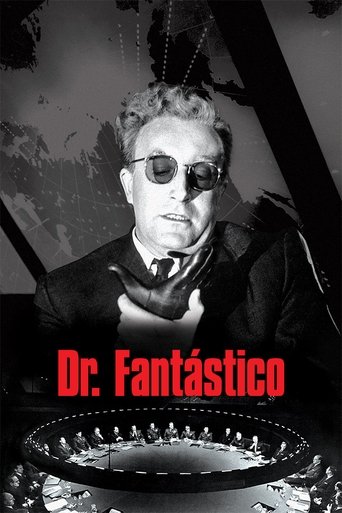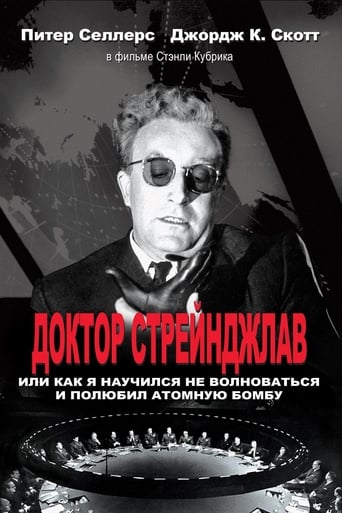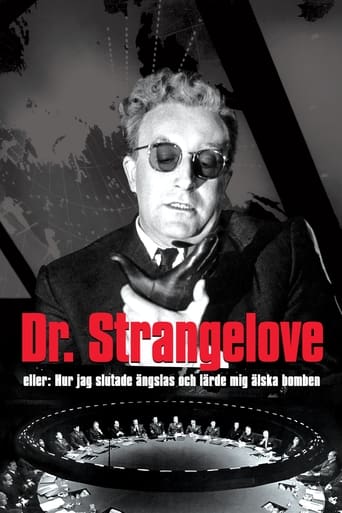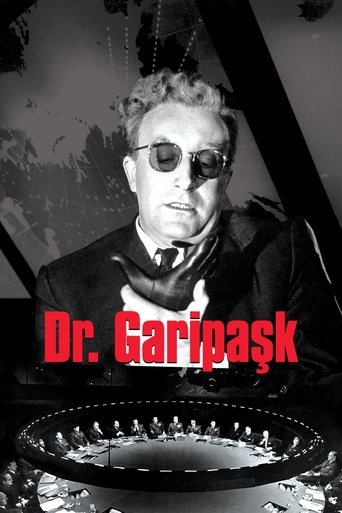
Dr. Strangelove or: How I Learned to Stop Worrying and Love the Bomb
The hot-line suspense comedy.
1964 | 95m | English
Popularity: 6 (history)
| Director: | Stanley Kubrick |
|---|---|
| Writer: | Stanley Kubrick, Terry Southern, Peter George |
| Staring: |
| After the insane General Jack D. Ripper initiates a nuclear strike on the Soviet Union, a war room full of politicians, generals and a Russian diplomat all frantically try to stop it. | |
| Release Date: | Jan 29, 1964 |
|---|---|
| Director: | Stanley Kubrick |
| Writer: | Stanley Kubrick, Terry Southern, Peter George |
| Genres: | War |
| Keywords | usa president, general, cold war, strategic air command, nuclear missile, cynical, war room, bomber pilot, nuclear weapons, ex-nazi, anti war, doomsday device, absurdism, critical, audacious, farcical, sardonic, quirky comedy, everyone dies |
| Production Companies | Columbia Pictures, Hawk Films |
| Box Office |
Revenue: $9,500,000
Budget: $1,800,000 |
| Updates |
Updated: Jan 11, 2026 Entered: Apr 13, 2024 |
| Name | Character |
|---|---|
| Peter Sellers | Group Capt. Lionel Mandrake / President Merkin Muffley / Dr. Strangelove |
| George C. Scott | General "Buck" Turgidson |
| Sterling Hayden | Brigadier General Jack D. Ripper |
| Keenan Wynn | Colonel Bat Guano |
| Slim Pickens | Major "King" Kong |
| Peter Bull | Botschafter De Sadesky |
| James Earl Jones | Lt. Lothar Zogg |
| Tracy Reed | Miss Scott |
| Jack Creley | Mr. Staines |
| Frank Berry | Lt. Dietrich |
| Robert O'Neil | Adm. Randolph |
| Glenn Beck | Lt. Kivel |
| Roy Stephens | Frank |
| Shane Rimmer | Capt. 'Ace' Owens |
| Hal Galili | Burpelson AFB Defense Team Member |
| Paul Tamarin | Lt. Goldberg |
| Laurence Herder | Burpelson AFB Defense Team Member |
| John McCarthy | Burpelson AFB Defense Team Member |
| Gordon Tanner | Gen. Faceman |
| Burnell Tucker | Mandrake' aide (uncredited) |
| Victor Harrington | War Room Aide (uncredited) |
| Peter Evans | War Room Aide (uncredited) |
| Name | Job |
|---|---|
| Laurie Johnson | Original Music Composer |
| Stanley Kubrick | Director, Screenplay |
| Terry Southern | Screenplay |
| Anthony Harvey | Editor |
| Ken Adam | Production Design |
| Pablo Ferro | Title Designer |
| Peter Murton | Art Direction |
| Stuart Freeborn | Makeup Artist |
| Barbara Ritchie | Hairstylist |
| Clifton Brandon | Production Manager |
| Eric Rattray | Assistant Director |
| John Aldred | ADR & Dubbing |
| John Cox | Sound |
| Leslie Hodgson | Sound Editor |
| Wally Veevers | Special Effects |
| Alan Bryce | Special Effects |
| Garth Inns | Special Effects |
| Kelvin Pike | Camera Operator |
| Bob Penn | Still Photographer |
| Ray Lovejoy | Assistant Editor |
| Michael Walter | Key Grip |
| Jim Body | Visual Effects Camera |
| Alan Stuart | Stunt Double |
| Pamela Carlton | Continuity |
| Richard Bird | Sound Recordist |
| Peter George | Novel, Screenplay |
| Gilbert Taylor | Director of Photography |
| Arthur 'Weegee' Fellig | Special Effects |
| Name | Title |
|---|---|
| Victor Lyndon | Producer |
| Leon Minoff | Executive Producer |
| Stanley Kubrick | Producer |
| Organization | Category | Person | |
|---|---|---|---|
| BAFTA Awards | Best Picture | N/A | Nominated |
Popularity History
| Year | Month | Avg | Max | Min |
|---|---|---|---|---|
| 2024 | 4 | 39 | 57 | 28 |
| 2024 | 5 | 46 | 63 | 34 |
| 2024 | 6 | 48 | 92 | 31 |
| 2024 | 7 | 49 | 86 | 28 |
| 2024 | 8 | 40 | 54 | 27 |
| 2024 | 9 | 33 | 45 | 22 |
| 2024 | 10 | 44 | 98 | 25 |
| 2024 | 11 | 41 | 59 | 25 |
| 2024 | 12 | 34 | 43 | 23 |
| 2025 | 1 | 29 | 37 | 21 |
| 2025 | 2 | 31 | 46 | 5 |
| 2025 | 3 | 11 | 34 | 2 |
| 2025 | 4 | 5 | 9 | 3 |
| 2025 | 5 | 5 | 11 | 4 |
| 2025 | 6 | 6 | 8 | 4 |
| 2025 | 7 | 4 | 6 | 3 |
| 2025 | 8 | 4 | 5 | 3 |
| 2025 | 9 | 4 | 6 | 3 |
| 2025 | 10 | 7 | 8 | 4 |
| 2025 | 11 | 3 | 4 | 3 |
| 2025 | 12 | 4 | 7 | 2 |
| 2026 | 1 | 4 | 7 | 3 |
| 2026 | 2 | 5 | 6 | 5 |
Trending Position
| Year | Month | High | Avg |
|---|---|---|---|
| 2026 | 1 | 357 | 736 |
| Year | Month | High | Avg |
|---|---|---|---|
| 2025 | 12 | 539 | 768 |
| Year | Month | High | Avg |
|---|---|---|---|
| 2025 | 11 | 646 | 844 |
| Year | Month | High | Avg |
|---|---|---|---|
| 2025 | 10 | 376 | 769 |
| Year | Month | High | Avg |
|---|---|---|---|
| 2025 | 9 | 259 | 755 |
| Year | Month | High | Avg |
|---|---|---|---|
| 2025 | 8 | 285 | 707 |
| Year | Month | High | Avg |
|---|---|---|---|
| 2025 | 7 | 352 | 669 |
| Year | Month | High | Avg |
|---|---|---|---|
| 2025 | 6 | 220 | 633 |
| Year | Month | High | Avg |
|---|---|---|---|
| 2025 | 5 | 95 | 687 |
| Year | Month | High | Avg |
|---|---|---|---|
| 2025 | 4 | 320 | 687 |
| Year | Month | High | Avg |
|---|---|---|---|
| 2025 | 3 | 520 | 766 |
| Year | Month | High | Avg |
|---|---|---|---|
| 2025 | 2 | 338 | 711 |
| Year | Month | High | Avg |
|---|---|---|---|
| 2025 | 1 | 286 | 737 |
| Year | Month | High | Avg |
|---|---|---|---|
| 2024 | 12 | 377 | 770 |
| Year | Month | High | Avg |
|---|---|---|---|
| 2024 | 11 | 629 | 801 |
| Year | Month | High | Avg |
|---|---|---|---|
| 2024 | 10 | 879 | 965 |
| Year | Month | High | Avg |
|---|---|---|---|
| 2024 | 9 | 513 | 757 |
| Year | Month | High | Avg |
|---|---|---|---|
| 2024 | 8 | 506 | 749 |
Stanley Kubrick's 1964 film <i>Dr. Strangelove</i> is a hilarious film about the nuclear annihilation of the human race. Its plot combines three strands that lead inevitably to this doomsday. In the first, an Air Force base commander (Sterling Hayden) goes insane and launches the go-code for hi ... s B52s to drop the bomb on their targets in Russia, while a British captain on an officer exchange program (Peter Sellers) tries to reason with him. In the second strand, we see the crew of a B52 commanded by the cowboyish Major Kong (Slim Pickens) as they prepare to drop the bomb. Finally, there are the scenes from the Pentagon war room, where the American president (again Peter Sellers) harangues a general (George C. Scott) about how this could have happened, until the mysterious German scientist Dr. Strangelove (Peter Sellers yet again) offers a solution. Originally meant to be a straightforward adaptation of a political thriller novel, <i>Dr. Strangelove</i> became a madcap comedy. The characters' sexual quirks, anti-Communist hysteria and nonchalance about the coming apocalypse and are exaggerated to the point of farce. No other Peter Sellers film shows off his range of talents so well: he segues effortlessly between Captain Mandrake, a nervous fellow with a British accident already antiquated at the time the film was made, the staid American politician President Merkin Muffley, and Dr. Strangelove, one of the Nazi scientists that the USA brought over after World War II. Filmgoers must have perceived this film somewhat differently, when the threat of nuclear annihilation felt very real. Contemporary audiences won't fully get how black this black comedy is. Nonetheless, this film remains perennially funny, and even after numerous viewings over the last 15 years or so I still laugh every time.
A U.S. bomber plane is heading for Russia. Communications are unavailable. The Commie Russians have built a doomsday device. And, according to crazy, (wheelchair-bound?), ex-Nazi scientist, Dr. Strangelove, nuclear destruction is upon us all! Thanks to this eccentric comedy, I now have considera ... ble respect for the talent of Peter Sellers. How he pulled off three totally different roles so convincingly is just beyond me. Especially his portrayal of the U.S. President; I could hardly believe that British Peter Sellers could do an American accent that naturally. This was apparently a very black comedy for its time, as the threat of nuclear war was really a thing when this was filmed. Offbeat, humorous script includes some eyebrow-raising, edgy dialogue and scenes. Would I recommend? Yes, to those with a open mind, or a taste for a truly bizarre kind of comedy.
**Sex and war in an extremely sarcastic and intelligent film.** This film is one of the best of director Stanley Kubrick's career, and is also one of the most iconic and acidic satire that cinema has ever seen. Inspired by a tense novel that was published in the same period, and by the political ... and military events that were taking place at the time, the film shoots in all directions to give us the most absurd and ridiculous image of the rivalry between the USA and the Soviet Union. Despite everything, and all the points in favor, I don't think this film is a true comedy. To me, honestly, it didn't make me laugh, although I absorb and understand the acidic irony that is here. The script begins with a very serious incident that could be true (and the US even reviewed its military strategies in order to prevent something similar from happening in real life): after inventing, in his troubled mind, a crazy conspiracy theory according to which the Soviets are poisoning American drinking water, a crazed general initiates a pre-orchestrated military protocol designed to retaliate against a Russian attack with the full force of their nuclear arsenal. But with one detail: there was no Russian attack, which would make the Americans the aggressor country, and responsible for a holocaust of biblical proportions. Informed of this, the president meets with his generals and, in direct articulation with the Kremlin, tries by all means to prevent the worst. What's extraordinary about this film is the way it ridicules the sexual arousal that several characters have around nuclear war. For these characters, the end of the world, total war, is an absolute fetish, portrayed in almost erotic detail. The most obvious cases are Generals Ripper and Turgidson: each, in his own way, vehemently expressing the mental connection they make between sex and war. Whether by the way they speak and express themselves, or more implicitly, by holding phallic elements that are increasingly evident, they are men who are horny in war. In the same line of thought, the commander of the American aircraft, who becomes a cowboy on horseback in the bomb, as if this were an extension of his male phallus. And what about the character of Strangelove? His name says it all! He is a Nazi scientist in the service of the Americans, and the way he tries to contain his excitement in anticipation of the end of the world is evident, for example, in the idea he suggests of a bunker where the survivors, handpicked (the Nazi idea of the eugenics is very present here), would spend their time having sex to save the human race. This is one of the great films in the career of Peter Sellers, a British actor who is famous for comedy. I've seen several of his films, and I already know his ability to play more than one character in the same film. Here, he gives life to three of the main characters, always with the same quality and professionalism. He is so good that it was really difficult to recognize the actor. George C. Scott and Sterling Hayden are also to be congratulated for the work they did in this film, which was certainly one of the ones that most immortalized them as actors. The best technical aspect of the film is the cinematography. Kubrick used various techniques to convey his erotic-military message, such as the opening credits, where an in-flight refueling becomes a symbolic copulation. The camera framing was also thought out in detail, with strategically placed close-up scenes, some characters very well highlighted and others reduced to the smallest expression of themselves (the American president, who is portrayed as incompetent, like his army is able to control). The film is a true lesson in black-and-white cinematography. The sets and costumes are also excellent, and the attack on the air base is one of the best and most realistic combat scenes I've seen in a modern war film. The soundtrack, finally, is one of the most ironic there is, and it perfectly matches the tone of the film. Highlight, of course, for the opening and ending themes.
Just as "Seven Days in May" was hitting our screens, Stanley Kubrick used a superbly over-the-top effort from Sterling Hayden to depict a rogue general who has decided to use all the checks and balances in place to defend the United States to his own mischievous advantage and launch a pre-emptive bo ... mbing campaign on those pesky "Ruskies". It's only his perfectly moustachioed British executive officer "Mandrake" (Peter Sellers) who smells a rat, but he is on lockdown in their air force base that is, indeed, being besieged - but not by the "Reds". Meantime, the American President (also Sellers) is only just finding out that he's about to start a nuclear war and nobody knows quite how to top it - not even his chief of staff "Turgidson" (George C. Scott). A call to his opposite number in the Kremlin reveals that the Soviets haven't been letting the grass grow, and that they have their own shield - and one that's use would make the effects of the Hiroshima bomb look like a damp squib. With all this mistrust and mayhem abounding, is it going to be possible to avert the destruction of humanity? Sellers has multiple parts and carries them out effectively, but it's the support from Hayden, Scott and the gung-ho, yee-ha, merchant "Maj. Kong" (Slim Pickens) - in charge of the heavily laden bomber that is likely to stat the conflagration, that demonstrate really entertainingly not just the faults in the whole principle of a paranoia-driven command and control structure, but also of the flaws of human nature when it comes to increasing reliance on technology and automation. The calculating eponymous character, who could have come straight out of a "Bond" movie, also quite cleverly points to the provenance of so many of the scientists who supported the West's military programming whilst their historical loyalties were dubious at best. It's only ninety-odd minutes, but packs plenty to think and laugh about as the ridiculousness and seriousness of the scenario are presented satirically and potently, at a time when the cold war was warmer.










![DR. STRANGELOVE OR: HOW I LEARNED TO STOP WORRYING AND LOVE THE BOMB Official Trailer [1964]](/extra_thumbs/Ja3n2Mxf21s.jpg)












